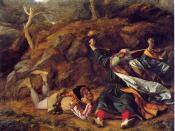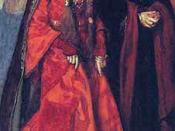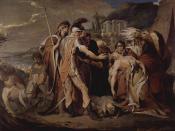In the play King Lear, the struggle between chaos and order could be dramatised and highlighted through different productions, reflecting certain perspectives. Shakespearean critic, Kathleen McLuskie, criticises King Lear from a feminist perspective, arguing that both the narrative and dramatisation of the play portrays a misogynistic and conservative patriarchal society, which was considered as the natural order of things. Chaos in the society occurs when females, Gonerill and Regan are empowered through the division of the kingdom, thus creating a struggle between chaos and order. A Marxist argument however, would dramatise the collision between the eroding values of the feudal era and the emergence of individualism. Such changes in social condition result in a power struggle between classes, consequently resulting chaos between the old and new order.
The feminist approach examines the society in King Lear as a patriarchy where men generally have power over women. This was considered as the only acceptable equation between 'human nature' and male power.
In the play, Lear represents the authority figure not only of his family, but of his kingdom as well. His sense of power and domination is intensified through the absence of both the mother and Queen in the patriarchal society. This immediately establishes the power of male dominance in a patriarchal society. In Modern Shakespeare Company's production, Lear enters the play with a bright golden crown on his head. The crown emphasises Lear's important status as well as accentuating the idea of male domination. The overpowering of male exemplifies sexual injustice and is consolidated through Lear's "love test". Through his "love test", the audience can see that Lear expects his daughters to perform the traditional role women perform for men, that is to express "which of you shall we say doth love us most". Gonerill and Regan, who are...



Great
True! I agree with you! Great job
1 out of 1 people found this comment useful.